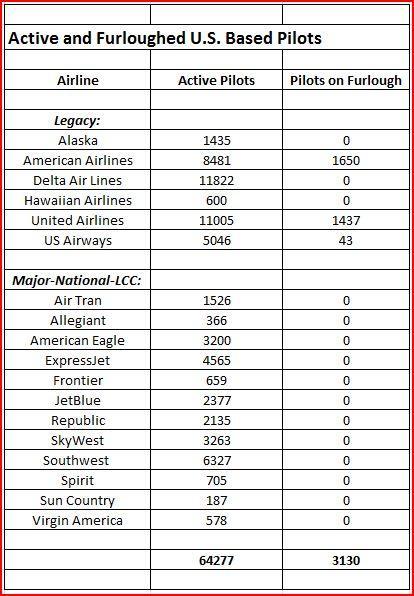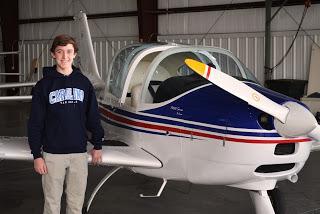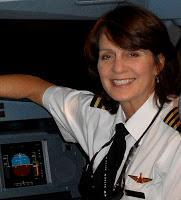I am regularly contacted by young people considering a career in aviation and I have, at times, struggled with whether I should discourage enthusiasm for what many consider to be a career on the decline. In the end, however, I cannot and have not turned people away from what I still consider to be a profession worthy of pride.
The last ten plus years have not been good to the US airline industry and its roughly 485,000 full time employees. There have been other notable downturns and slowdowns caused by events like the oil embargo of 1973 and President Ronald Reagan's mass firing of 11,345 air traffic controllers in 1981, but neither of those events was as harsh on the industry as the perfect storm experienced since 2001. The combined effects of the September 2001 terrorist attacks, SARS, age 65, high oil prices, a terrible economy and stiff competition from new low-cost airlines have resulted in a tumultuous ten year period.
Some airlines fared better than others...
Some carriers, like Dallas based Southwest Airlines, have fared better than others. At least from the outside looking in, Southwest has successfully fostered a friendly work environment for its employees that reaps benefits for its customers and keeps people coming back. There is enormous value to be found in a content and satisfied workforce that is difficult to quantify on a spreadsheet and, for that reason, routinely ignored by airline management, but Southwest's success is not solely based on their famous culture. In addition to keeping their people happy, the company made sound business decisions along the way. Southwest was almost clairvoyant in its aggressive approach to fuel hedging, a program designed to reduce exposure to volatile and potentially rising fuel costs. While many of its competitors were forced to sell hedges in order to remain solvent, Southwest increased its contracts and managed to hedge far more than its competitors, saving $3.5billion on its fuel bill between 1999 and 2008...far better than its competitors. For its efforts, 2012 marked the airline's 40th consecutive year of profitability.
Some airlines struggled, but recovered faster than others...
For the rest of the U.S. airline industry, the last ten years have been difficult, but improved results and black ink has come sooner for some than for others. Take Delta Air Lines for instance. Before the company declared bankruptcy in 2004, Delta pilots were among the highest paid in the world with some wide body Captain's reporting nearly $300,000 in yearly income. Post-bankruptcy hit the pilots hard with deep pay cuts and forfeited retirement funds; but under strong management, the airline has flourished. The 2008 merger with Northwest Airlines was one of the smoothest airline integrations in history and has served the company, its employees and its customers well. The pilots at Delta are once again at the top of the industry and the airline is still growing and eating up market share around the world.
Some airlines still haven't emerged...
Other airlines have not performed as well. Until its November 2011 bankruptcy filing, American Airlines had earned bragging rights for being the only legacy airline in the United States to avoid bankruptcy court. The pilots at American agreed to a concessionary contract in 2003 that was designed to keep the carrier out of bankruptcy by approving a 23% pay cut in addition to reduced benefits. After the pilots took their 23% pay cut, American Airlines management took a 23% pay raise and awarded themselves with multi-million dollar bonuses.
Before the 2003 contract, the pilots at American had already been lagging behind the industry with regard to pay and benefits, and the new contract gave American an enormous cost advantage over its rivals, but the contractual efficiencies were largely squandered by a lackluster management team. By the time competitors like Delta and United successfully renegotiated new employee contracts, American had not only lost its cost advantage but had also lost significant market share in a failed strategy aimed at "shrinking to profitability." Bankruptcy was inevitable.
10,000 furloughed pilots...
Before the industry downturn that began in 2001, American employed more than 13,000 pilots. Today the airline has around 8,000 active pilots and lists 1,650 as furloughed. At its worst, American and the rest of the US airline industry had close to 10,000 pilots on furlough and still hasn't brought them all back to work.

Statistics compliments of www.AirlinePilotCentral.com as of 1/2013.
Expectations...
When I was hired in 1999, I was told I would be a wide body international First Officer in two years and a Captain in eight. With a 30 year career ahead of me, I was told to expect a retirement account worth around $3 million with medical benefits to care for me when it was all over. Today, after almost 14 years as a pilot for a major airline, I am still a junior MD80 First Officer. My prospects for occupying the left seat are dismal, my retirement funds have been frozen or terminated and I will receive no medical benefits after I retire. I was displaced out of my home base for four years and spent most of the last ten years as a reserve pilot at the beck and call of crew schedule. Needless to say, it hasn't been the career I thought I was signing up for, but as bad as it has been, I would do it all over again in a heartbeat...and that is really the point I would like to make.
It is all too easy to lose sight of all the great things in life, clouded by what could have been better.
I am thankful for a great job and I am thankful that someone is still willing to pay me very good money to fly airplanes for a living. I love the airplane I fly and only astronauts could claim to have a better office view. The feeling of a well flown approach or a smooth landing in difficult conditions is one that cannot be duplicated in another line of work. I enjoy the people with whom I work. I visit cities all over the country and will someday fly all over the world. I know a lot of people who work much harder than I do at jobs they don't necessarily enjoy for much less money.
Recently, I had an email conversation with a young man who wants very much to have a career as a professional pilot. Swayne was surrounded by aviation as a child and has developed a real passion for learning to fly and finding a way to make a career doing something he loves. As he began to research what it took to become a pilot, he discovered a number of online forums for pilots. I suspect he had high hopes of finding like-minded people who shared his love for aviation and were also willing and able to provide information about the journey that awaited him. Unfortunately, what he found was what he calls the "dark side" of aviation.
I believe there is value in understanding the good and bad aspects of a career choice, but what Swayne found was only the negative. One person told him to “run man.... run fast.... run away...” Another stated "You could end up multi-divorced, bankrupt with no retirement, and permanently disqualified from flying (medical, violation, training failures).” I know a few doctors and lawyers who might say the same about their career choices. Every line of work has its ups and downs, but as the old saying goes…choose a job you love and you'll never work a day in your life.
I have come to realize that my happiness with life in general is largely dependent on expectations...were they or were they not met. When I take my children out to dinner, I am very clear about my expectations regarding their behavior. I want them to sit quietly, eat their food politely and engage in meaningful conversation...the parents out there know that is often a tall order. If I make my expectations known, then at least everyone is on the same page. If my expectations are not met, then I may not be happy with the evening, but I am still happy and in love with my children.
Our careers are much the same. I had expectations for my career that were not met, at least not on the time line I anticipated. While I am not happy with this, I still love my job and have difficulty imagining myself doing anything else.
I am sad to say that it is not uncommon for me to come in contact with people who have forgotten that they have a job they once longed for and worked very hard to get. Maybe their expectations were not met, but it is far too easy to get caught up in all the negativity...and that's no way to live. Is the job as good as it used to be? Will it ever be as good as it once was? Maybe not, but I think my friend, author and fellow blogger Karlene Petitt put it best when she said "I guess it depends if you are flying for the end goal, or the journey." I am here for the journey and I think Swayne is too.
You can follow Swayne's progress toward a career in aviation on his blog,
"From Private to Professional Pilot"

Karlene Petitt, Seattle based A330 Pilot, Grandma, Author, Mentor, Motivator, Speaker and Artist. Read her blog or purchase one of her books here:
"Flight To Success"

